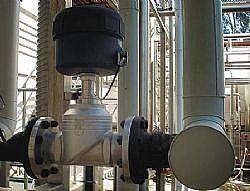RELIABLE industrial valves are helping Australias largest co-operative dairy manufacturer to reduce downtime, improve efficiency and enhance safety levels.
The Murray Goulburn Co Operative is supplied by more than 3000 farms in New South Wales and Victoria and produces a range of butter, milk and cheese products.
The Co Ops eight processing plants produce more than 35 percent of national milk consumption, and 45 percent of Australias total dairy exports. The first of Murray Goulburns facilities, located at Cobram in northern Victoria, operates 24 hours a day to produce cheeses, whey products, lactose, milk and cream.
Demanding conditions found within the dairy industry necessitate powerful cleaning and sterilisation; needs which are met at Cobram by a comprehensive CIP system utilising steam under pressure and caustic solution treatments, along with water wash-downs.
Heath Crawford, maintenance planner supervising the Cobram facility, said that a major problem was that the valves used across most systems couldnt handle the demands of the aggressive CIP system, which cycles through continuously 24 hours a day.
After ongoing issues with existing CIP valving we replaced the troublesome products with Brkerts 2000 series Angle Seat models, says Crawford.
That was eight years ago, and since that time the valves have operated faultlessly. It was soon after that installation that we made the decision to move to Brkert wherever our specialised site technologies would allow.
The performance of the 2000 series Angle Seat Valves at the Cobram plant made local Brkert area sales manager David Mennie the first call for a recent emergency replacement of a failed 100mm isolation ball valve on the steam line.
The old valve had necessitated frequent servicing and maintenance, causing unplanned downtime and reduced system productivity. The Type 2012 100mm flanged Globe Valve was despatched for next-day delivery, and successfully installed. The Co Op has since ordered two more of the large globe valves for other processes at the site.
Mennie says that although valves may be advertised as comparable, it is worth taking the time to compare the valve body and diaphragm materials as well as the quality level to which the valve is manufactured.
Brkert valves are German engineered and wholly manufactured in our European factories. You will find these days that some companies are buying coils from one manufacturer, and diaphragms from another, and then just assembling the pieces it is hardly surprising that pieces often dont quite fit. And then there are problems, he said.
Mennie said that the issues faced by the Murray Goulburn plant which operates within a stringent OHS charter mirror those of many Australian manufacturers.
The integrated nature of manufacturing plants in Australia means that it is the least-reliable system component that establishes reliability and uptime levels for the whole site. When one system fails, it generally impacts throughout operations.
The Cobram facility had experienced issues of fundamental unreliability, with the sites old valves typically experiencing degradation of the O-ring due to heat, caustic and wear within a few months of installation.
Related costs included, for example, the replacement of expensive rubbers and drive plates which were cooked by steam escaping under pressure from the old valves.
Of additional concern to Cobram management was the potential for serious workplace injury from escaping caustic or steam sprays, with some minor incidents involving caustic spray splashes onto employees experienced.
Getting the best equipment on-site at Cobram has given us enhanced service levels across the board, as well as increasing the degree of safety with which we operate, says Crawford.






